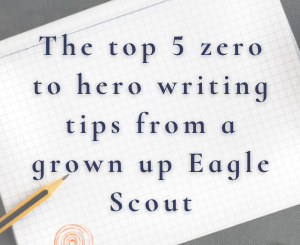How to Use Facts and Scientific Studies for Writing Online by Beth Barany
 You know how to help your clients, and now you want to reach more potential clients through your writing online. You may struggle with how to insert facts and refer to scientific studies to back up your experience and share the benefits of working with you. I’ll explain how to do so in this article.
You know how to help your clients, and now you want to reach more potential clients through your writing online. You may struggle with how to insert facts and refer to scientific studies to back up your experience and share the benefits of working with you. I’ll explain how to do so in this article.
First it’s helpful to understand that writing for your business, or writing web copy, is really about communicating with your core audience in ways they can understand and in a way that grabs them by the heart and gut so that they will take action, usually signing up for a session or a course, or commenting on a post.
In my work with authors, heart-based entrepreneurs and healers, I have noticed that the biggest stumbling block they have in their writing is confidence. How will you be perceived if you tell the truth as you see it? Will you get the actions you desire? Also, what will happen if you do get the response or action you request? That’s the kind of problem you want to have. ![]()
In the rest of this post I’ll address what’s important to integrating facts and refering to scientific studies in your online writing, and how to do it, so that you can feel confident when you do so.
To put in perspective the use of facts, know that stories are actually what we humans respond to, more than raw facts. In fact, the New Scientist reported in 2008 in their article “The science of fiction” by Keith Oatley, that neuroscientists have shown how reading fiction increases empathy.”
Since that study was released even more studies have been done. Neuroscientists have revealed what storytellers have always known, that humans are hard-wired for story. Lisa Cron underscores this in her book, Wired For Story: The Writer’s Guide to Using Brain Science to Hook Readers from the Very First Sentence (Ten Speed Press, 2012). Stories are how we make sense of the world.
That being said let’s address the purpose of using facts and referring to scientific studies in your writing for your business. One of the main reasons you’d want to use and refer to facts is to show that you’re not the only one who thinks and feels what you do.
For example, if you are addressing the health concerns of your audience, you may want to state what you know is true, in the context of the study, like I did above:
“In fact, the New Scientist reported in 2008 in their article “The science of fiction” by Keith Oatley, that neuroscientists have shown how reading fiction increases empathy.”
In this way, you can use the facts to support your statement, or refute it.
Another reason you may want to use facts or refer to a scientific study is that you want to increase your credibility. In busines, this is often called “third-party endorsement.”
For example, Dr. Jeffrey H. Toney writes about the benefits of music to humans on the ScienceBlogs.com site: “Your Brain on Music: Pure Joy”. Essentially he explains what’s happening in the brain to have music make us feel good. After recognizing the experience of joy we all often experience when listening to music, he adds: “Canadian scientists have documented in a study published in Nature Neuroscience that not only listening to music, but the anticipation thereof, can release the neurotransmitter dopamine in the brain.” He cites the study and even quotes from it.
In your posts, you can do what I just did in the above parapgraphs:
1. State your opinion or fact.
2. Use an article or study to back it up.
3. Quote one to four sentences.
4. State your link or citation.
If you’re ready integrate this kind of writing into your copy, your next step is to go for it. Then get feedback on your writing if you’re not sure how what you’ve just written comes across. I also recommend you read lots of blogs by others in your field that you admire to see how other people cite facts and studies. Lastly, double-check your facts to be sure that you communicated them clearly.
Above all, remember that your writing online (and off) is about communication. When I review my material to be released to my readers (like this post, for example) I re-read my material, often aloud and make sure my facts and opinions are presented in a compelling, interesting, and useful way. I encourage you to do the same.
If you have any questions about how to use facts and scientific studies in your online writing, please post your comments below, and I’ll answer.
Permission to reprint in full granted, with this copyright notice and author bio. c. 2013 Beth Barany
(This article as first published on Alara Castell’s awesome blog, and was based on a question from one of her readers.)
About Beth Barany
 BETH BARANY, a certified creativity coach. She helps writers get their writing done. She’s the bestselling author of THE WRITER’S ADVENTURE GUIDE and OVERCOME WRITER’S BLOCK. Her young adult epic fantasy novel, HENRIETTA THE DRAGON SLAYER, won Grand Prize in the 2012 California Book Fiction Challenge. More about Beth on her site: http://www.bethbarany.com.
BETH BARANY, a certified creativity coach. She helps writers get their writing done. She’s the bestselling author of THE WRITER’S ADVENTURE GUIDE and OVERCOME WRITER’S BLOCK. Her young adult epic fantasy novel, HENRIETTA THE DRAGON SLAYER, won Grand Prize in the 2012 California Book Fiction Challenge. More about Beth on her site: http://www.bethbarany.com.







Interesting! I think confidence is key, no matter what we’re writing. These are great tips for increasing our confidence, especially when writing opinion pieces with facts.
Shallee, Thanks for stopping by! Glad you liked the post. {I’ll be posting my Healthy Writers Club post tomorrow. 😉 } Everyone — Shallee McArthur is the founder of the fun Healthy Writers Club. Join us!
Great post! I have been blogging for a year and my confidence is just now starting to grow. Thanks for the information!
Great post, I too reread my post to make sure they make since & engaging at the same time.
Thanks Susie! And you’re welcome!
Thanks Genae for stopping by.
Good luck with your writing, both of you!
Wow! This is very helpful, and I get the feeling that you really know what you’re talking about. You seem very informative. Thanks so much!
Great post – I love facts and studies and sometimes think that my enthusiasm for them turns people off, so I rarely use citations these days. Reading this I’ll add a few more back in my writing 🙂 Thank you!
Amy, You’re so welcome!
Please do, Jan. 🙂